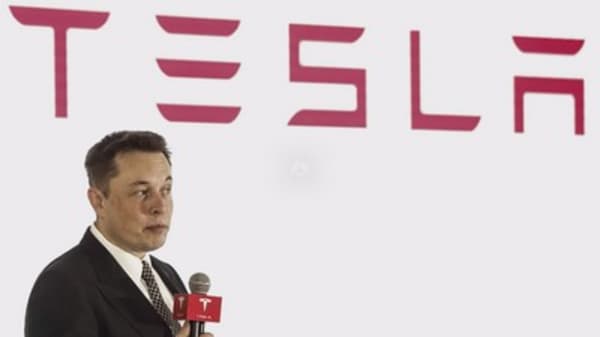
Tesla delivered 83,500 vehicles during the third quarter, beating Wall Street analysts' expectations for deliveries.
But investors are still concerned about the company's profitability and were disappointed it didn't release more detailed data on its production costs and sale prices, analysts said.
Tesla's shares fell 1.3 percent in midmorning trading despite beating Wall Street estimates for 80,500 deliveries during the quarter, according to data compiled by FactSet.
The company produced 80,142 total vehicles: 26,903 Model S and X vehicles combined, and 53,239 Model 3 sedans.
Its overall deliveries, which included 55,840 of its Model 3 sedans, were comparable to 80 percent of all of its deliveries for 2017, the company said Tuesday. Model 3 deliveries were slightly above consensus estimates of 55,600, according to FactSet. Analysts had lowered their prior estimates over the last week or so, making it easier for Tesla to beat Wall Street expectations.
"With production stabilized, delivery and outbound vehicle logistics were our main challenges" during the third quarter, the company said in a statement. "We made many improvements to these processes throughout the quarter, and plan to make further improvements in [the fourth quarter] so that we can scale successfully."
Tesla said it was able to "significantly increase" Model S and X deliveries during the quarter, "notwithstanding the headwinds we have been facing from the ongoing trade tensions between the US and China."
"The production and delivery numbers were a positive surprise for sure," said CFRA analyst Garrett Nelson. "They actually delivered into their guidance. So it seems like they have really improved operationally during the quarter, based on these results."
Investors are disappointed because Tesla didn't provide details on average sale prices or vehicle costs, he said. Investors have long been concerned about Tesla profit margins, especially the Model 3. Nelson said some of the company's good news came out ahead of the report and was already priced into the stock.
The mix of vehicles — comprised in large part of more expensive versions of the Model 3 sedans — suggests that Tesla could be turning a profit on all of its cars, Oppenheimer analyst Colin Rusch said in a research note published Tuesday. But investors were hoping to see more detailed data on its manufacturing costs and cash flow, especially since the automaker said it plans to speed up construction of its factory in Shanghai.
The company said it is accelerating construction of the Shanghai factory to try to minimize the impact of the tariffs, which have increased the tax rate on Teslas sold in China to 40 percent, compared with 15 percent for all other imported cars, the company said.
"Taking ocean transport costs and import tariffs into account, Tesla is now operating at a 55% to 60% cost disadvantage compared to the exact same car locally produced in China," the company said. "This makes for a challenging competitive environment, given that China is by far the largest market for electric vehicles."
Tesla said other disadvantages in China include a lack of cash incentives available to local automakers.
Tesla previously set a goal of producing between 50,000 and 55,000 Model 3 sedans during the quarter. Heading into the report, expectations were that the company had exceeded that goal. The Model 3 is Tesla's midsize electric sedan, and the car that is meant to turn Tesla into a mass manufacturer of electric vehicles.
CEO Elon Musk has repeatedly said he expects the company to be profitable for the third quarter. Tesla has had only two profitable quarters since it went public in 2010.
Musk recently reached a settlement with the U.S. Securities and Exchange Commission over charges of fraud resulting from comments he made about taking Tesla private. Under the terms of the settlement, Musk and Tesla will pay fines of $20 million each, and Musk will step down for at least three years as chairman.


0 Comments